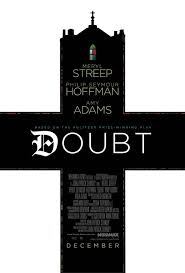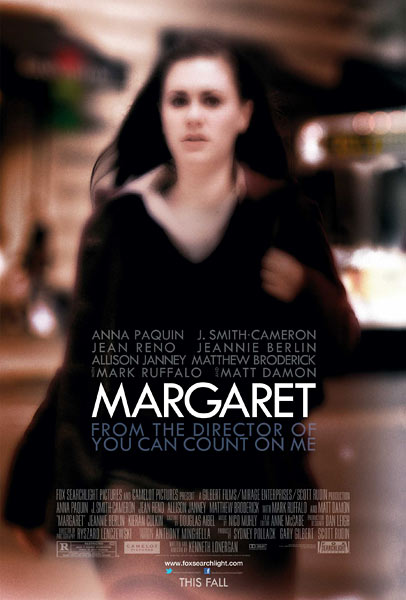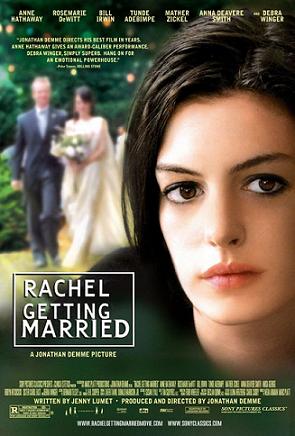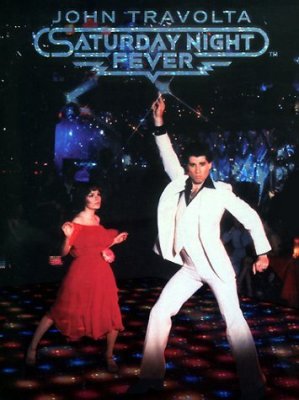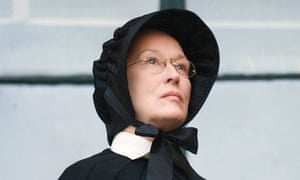
Don’t let truth get in way
of dazzling drama of ‘Doubt’
To fully appreciate “Doubt,” one must set aside a crucial bit of skepticism that some may experience: that a woman such as Sister Aloysius is not capable of the type of emotion she exhibits near the end of the film.
Beyond that, “Doubt” is a masterwork of drama, an exceptional performance by Meryl Streep and a remarkably fresh story involving elements of child abuse.
How many Oscars does Meryl Streep have? Two, one for best supporting actress in “Kramer vs. Kramer” of 1979 and one for best actress in “Sophie’s Choice” of 1982. She is presently on a streak of 11 straight nominations without a win, 15 total, a staggering resume.
Her most recent Oscar-nominated effort, “Doubt,” will pose a challenge for many viewers. They will be inclined to try to deduce “truth” at the expense of appreciating great drama. The drama is not over whether a particular incident or series of incidents occurred. Rather, this is a film about whistleblowing, and challenging strict authority — when we may not be 100 percent certain we are right.
Sister Aloysius is not in the same position as Charlize Theron’s Josie of “North Country,” a woman at great risk of reprisals if she reports her concerns. Aloysius, as a highly respected principal who turned to the convent later in life, could presumably be punished if her reports were not believed or liked. But she is far less concerned with that than with the moral ramifications of her suspicions. She knows it is possible that only she stands between a boy and abuse.
The most powerful scene will come from Streep, but maybe the most interesting is a brief shot of Philip Seymour Hoffman at dinner with a couple of fellow priests. There is no hint here that Hoffman might be hiding something. It is noteworthy in that the viewer sees it, but Aloysius does not. If she could, would it change her mind? Probably not — after all, she knows people.
The toughest critics will wonder, rightly so, whether this is indeed a movie about the Meryl Streep character, or the Amy Adams character, Sister James, and whether their Oscar categories should be reversed. It is undeniable that Streep owns the most powerful scenes. Yet Adams is the one performing the coming-of-age chores, and presumably she is the one left with a greater understanding of life — that maybe our instincts are worth trusting only up to a point.
To win the Oscar as supporting actress, Adams will have to beat out another colleague — Viola Davis, who plays a dismayed parent in an extraordinary brief appearance. The beauty of her conversation with Aloysius is that it transpires as many real conversations of that nature would — a sense of inconvenience, I don’t have time for this, in fact I don’t really want to talk or think about this, etc., until Aloysius forces her to take a stand.
Davis’ work is so short-lived, it doesn’t seem like it should be Oscar-worthy, but hers is a scene that will linger permanently in the minds of viewers who understand completely how shame impairs our pursuit of righteousness. There is certainly precedent for small roles receiving the best supporting actress Oscar — maybe the best example being Beatrice Straight in “Network” — but Davis is probably facing steep odds.
As Father Flynn, Philip Seymour Hoffman, whose credentials are impeccable, has likely accepted a role that is beneath his skills. His Oscar nomination, as they say of sports’ all-star game choices, seems more based on reputation than anything else.
Father Flynn is not there to push the story along. He is there to provide objective, but only circumstantial, evidence for evaluating the suspicions of Aloysius. In one moment is he asked to act, and he of course carries this off quite well — when Aloysius confronts him and he must issue protestations, some more convincing than others. The rest of the time he alternates between ideal male role model and squirrelly guy with something to hide.
John Patrick Shanley, who wrote and directed the film and also wrote the play, draws on his own Catholic school experiences in the Bronx. The movie’s St. Nicholas is engagingly authentic, set on a quiet corner in a tough but clean blue-collar neighborhood. The setting is an appealing throwback to what many see as simpler times, when schoolkids wore uniforms, were taught by nuns, were punished for being out of line, and the biggest threats to this world were not gangs, drugs and mosh pits, but cutting class and sneaking in earpieces to listen to baseball games.
Where Shanley reaches a bit for cliche is in the time — 1964, which, it is made abundantly clear, is shortly after the JFK assassination and the same era used by gobs of films to imply that America is changing for the worse. Shanley’s script puts us on the precipice — we’re entering an era of more enlightenment in which possible transgressions by some of the males in the film can be stopped, but we’re not quite there yet, and maybe are reluctant to accept the loss of innocence that implies.
3.5 stars
(January 2009)
“Doubt” (2008)
Starring Meryl Streep as Sister Aloysius Beauvier ♦ Philip Seymour Hoffman as Father Brendan Flynn ♦ Amy Adams as Sister James ♦ Viola Davis as Mrs. Miller ♦ Alice Drummond as Sister Veronica ♦ Audrie Neenan as Sister Raymond ♦ Susan Blommaert as Mrs. Carson ♦ Carrie Preston as Christine Hurley ♦ John Costelloe as Warren Hurley ♦ Lloyd Clay Brown as Jimmy Hurley ♦ Joseph Foster II as Donald Muller ♦ Bridget Megan Clark as Noreen Horan ♦ Mike Roukis as William London ♦ Haklar Dezso as Zither Player ♦ Frank Shanley as Kevin ♦ Robert Ridgell as Organist ♦ Sarah Giovanniello as Choir Singer #1 ♦ Katie Shelnitz as Choir Singer #2 ♦ Aaron O’ Neill as Choir Singer #3 ♦ Thomas J. Meehan as Choir Singer #4 ♦ Samantha Chadbourne as Choir Singer #5 ♦ Christina Angelina Celone as Choir Singer #6 ♦ Melissa Viezel as Choir Singer #7 ♦ Emily Swimmer as Choir Singer #8 ♦ Katelyn Snell as Choir Singer #9 ♦ Shayne Fischman as Choir Singer #10 ♦ Coby D. Moran as Choir Singer #11 ♦ Alannah Iacovano as Girl in Church ♦ Frank Dolce as Ralph ♦ Paulie Litt as Tommy Conroy ♦ Matthew Marvin as Raymond ♦ Philip Post as Sister James’ Student #1 ♦ Thomas J. Kennedy as Sister James’ Student #2 ♦ Thomas A. Varrone as Sister James’ Student #3 ♦ Sabrina Costa as Sister James’ Student #4 ♦ Samantha Buczek as Sister James’ Student #5 ♦ Gabriella Renne DiMaria as Sister James’ Student #6 ♦ Ariana Silvestro as Sister James’ Student #7 ♦ Michele Ciago as Sister James’ Student #8 ♦ Anna Lonczak as Sister James’ Student #9 ♦ Brandy Panfili as Sister James’ Student #10 ♦ Molly Chiffer as Sarah ♦ Lydia Grace Jordan as Alice ♦ Suzanne Hevner as Mrs. Kean ♦ Helen Stenborg as Sister Teresa ♦ Tom Toner as Monsignor Benedict ♦ Michael Puzzo as Father Sherman ♦ Margery Beddow as Mrs. Shields ♦ Jack O’Connell as Mr. McGuinn ♦ Marylouise Burke as Mrs. Deakins ♦ Valda Setterfield as Parishioner ♦ Timothy J. Cox as Parishoner ♦ Steph Van Vlack as Church patron
Directed by: John Patrick Shanley
Written by: John Patrick Shanley
Producer: Scott Rudin
Original music: Howard Shore
Cinematography: Roger Deakins
Editing: Dylan Tichenor
Casting: Ellen Chenoweth
Production design: David Gropman
Art direction: Peter Rogness
Set decoration: Ellen Christiansen
Costume design: Ann Roth
Makeup and hair: Todd Kleitsch, Alan D’Angerio, J. Roy Helland, Louise McCarthy, Jerry Popolis, Valerie Gladstone-Hapel, Christine Fennell
Unit production manager: Celia D. Costas
Post-production supervisor: Jennifer Lane
Stunts: Peter Bucossi
